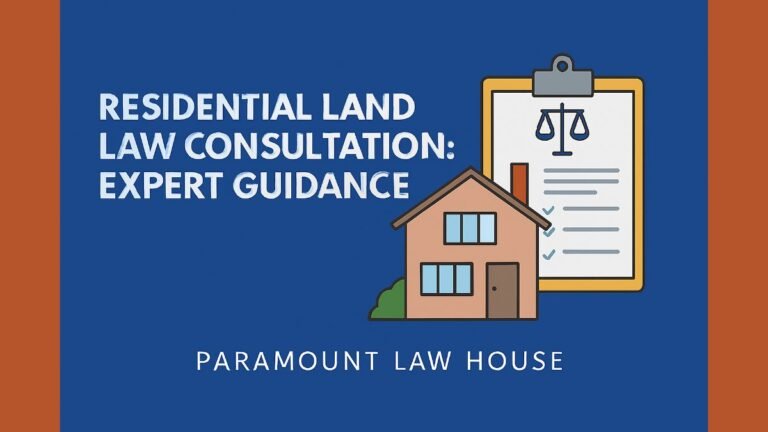Land Development Joint Venture Agreements: Legal Guidance
Land development projects, inherently complex and potentially lucrative, often necessitate collaborative efforts. Consequently, joint venture agreements emerge as crucial instruments for pooling…
Land development projects, inherently complex and potentially lucrative, often necessitate collaborative efforts. Consequently, joint venture agreements emerge as crucial instruments for pooling resources, expertise, and capital. In this intricate landscape, legal guidance becomes paramount, and Paramount Law House, with their 24×7 property law expertise, stands ready to shepherd clients through the process.
Navigating the Terrain: Land Development Joint Venture Agreements and Legal Guidance from Paramount Law House
Understanding the Foundation: What is a Joint Venture Agreement?
Essentially, a land development joint venture agreement is a legally binding contract between two or more parties who agree to combine their resources to develop a specific piece of land. This agreement, in other words, outlines the rights, responsibilities, and obligations of each party involved, ensuring clarity and minimizing potential disputes. In this context, parties might contribute land, capital, technical know-how, or marketing expertise.
Key Elements: The Legal Framework
Moreover, a comprehensive joint venture agreement should encompass several crucial elements. Firstly, it must clearly define the scope of the project, including the land parcel, the proposed development, and the timeline. Secondly, it needs to outline the capital contributions of each party, specifying the amount, form, and timing of such contributions. Thirdly, the agreement must establish a clear mechanism for profit and loss sharing, reflecting the agreed-upon ratios. Furthermore, the agreement should address the management structure, delineating the roles and responsibilities of each party in decision-making.
Furthermore, dispute resolution mechanisms are indispensable. In particular, arbitration or mediation clauses are often included to provide alternative avenues for resolving disagreements, avoiding costly and time-consuming litigation. Additionally, the agreement must address termination clauses, specifying the circumstances under which the joint venture can be dissolved. In any event, due diligence is a must.
Due Diligence: The Cornerstone of Prudence
Before entering into a joint venture agreement, parties must conduct thorough due diligence. This process, specifically, involves investigating the legal title of the land, assessing its development potential, and evaluating the financial viability of the project. In addition, it is essential to scrutinize the credentials and reputation of the potential joint venture partner. To that end, meticulous examination of all relevant documents, including land records, approvals, and permits, is vital.
Legal Considerations: Navigating the Regulatory Maze
Subsequently, land development projects are subject to a plethora of legal and regulatory requirements. These include zoning regulations, building codes, environmental clearances, and land acquisition laws. Similarly, the joint venture agreement must address compliance with these regulations, allocating responsibility for obtaining necessary approvals and permits. Therefore, it is crucial to seek legal counsel to ensure adherence to all applicable laws.
Profit Sharing and Financial Management: Ensuring Transparency
In the same way, the agreement must clearly define the profit-sharing mechanism, specifying the percentage allocation to each party. Also, it should outline the procedures for financial management, including accounting, auditing, and reporting. To illustrate, detailed provisions regarding the distribution of profits, the treatment of losses, and the management of project funds are essential.
Dispute Resolution: Safeguarding Interests
In case of disputes, the agreement should provide a clear and efficient dispute resolution mechanism. As previously mentioned, arbitration or mediation clauses can help parties resolve disagreements amicably, avoiding lengthy and expensive litigation. Moreover, the agreement should address the governing law and jurisdiction, specifying the legal framework that will govern the resolution of disputes.
Termination and Dissolution: Planning for Eventualities
Eventually, the joint venture may need to be terminated. The agreement should address the circumstances under which termination can occur, such as breach of contract, insolvency, or completion of the project. Likewise, it should outline the procedures for dissolution, including the distribution of assets and liabilities.
Paramount Law House: Your Legal Partner in Land Development
Specifically, Paramount Law House, with its team of experienced property lawyers, provides comprehensive legal guidance on land development joint venture agreements. With 24×7 availability, they offer timely and practical advice to clients, ensuring their interests are protected throughout the process. In particular, their expertise encompasses drafting and negotiating joint venture agreements, conducting due diligence, obtaining necessary approvals, and resolving disputes.
Drafting and Negotiation: Crafting a Robust Agreement
To begin with, Paramount Law House assists clients in drafting and negotiating joint venture agreements that are tailored to their specific needs. In other words, they ensure that the agreement is comprehensive, clear, and legally sound. Also, they advise on the various legal and commercial considerations involved in the agreement, helping clients make informed decisions.
Due Diligence and Compliance: Ensuring Legal Soundness
Additionally, Paramount Law House conducts thorough due diligence to ensure that the land and the potential joint venture partner are legally sound. Similarly, they assist clients in obtaining necessary approvals and permits, ensuring compliance with all applicable laws and regulations.
Dispute Resolution and Litigation: Protecting Your Interests
Finally, in the event of disputes, Paramount Law House represents clients in arbitration, mediation, and litigation. They strive to protect their clients’ interests and achieve favorable outcomes.
Frequently Asked Questions
Firstly, the agreement must accurately define the project’s scope, including land details and development plans. Secondly, it should clearly outline each party’s financial contributions and profit-sharing ratios. Thirdly, the agreement needs to detail management responsibilities and decision-making processes. Finally, it must include robust dispute resolution and termination clauses to safeguard all parties’ interests.
Due diligence is paramount because it allows you to verify the land’s legal title, assess its development potential, and evaluate the financial viability of the project. Moreover, it helps you scrutinize your potential partner’s credentials and reputation, minimizing risks and ensuring a sound investment.
Land development projects are subject to numerous regulations, including zoning laws, building codes, environmental clearances, and land acquisition laws. Accordingly, your agreement must address compliance with these regulations, clearly assigning responsibilities for obtaining necessary approvals and permits.
Agreements should incorporate clear dispute resolution mechanisms, such as arbitration or mediation clauses. These methods provide alternative avenues for resolving disagreements, avoiding costly litigation. Furthermore, the agreement should specify the governing law and jurisdiction.
The agreement must outline the circumstances under which termination can occur, such as breach of contract or project completion. Additionally, it should detail the procedures for dissolution, including the distribution of assets and liabilities. This ensures a clear and fair process for all parties involved.
Conclusion: Securing Your Land Development Venture
Ultimately, land development joint venture agreements are complex legal instruments that require careful consideration and expert legal guidance. Therefore, partnering with a reputable law firm like Paramount Law House can help you navigate the intricacies of these agreements and safeguard your interests. For that reason, with their 24×7 availability and extensive expertise, they provide the necessary support to ensure the success of your land development venture.
Read More
- Land Fraud Prevention: Secure Your Property Rights
- Land Grabbing Complaint Resolution: Legal Support Available
- Land Purchase Legal Opinion: Make Informed Decisions
- Land Sub-division Services: Navigate Regulatory Requirements
- Landlord-Tenant Issues Resolved: Expert Legal Support
- Ministry of Corporate Affairs (MCA)






